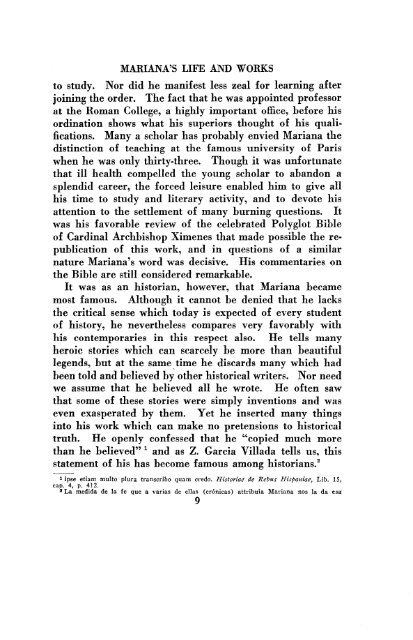The Political Economy of Juan de Mariana - Ludwig von Mises Institute
The Political Economy of Juan de Mariana - Ludwig von Mises Institute
The Political Economy of Juan de Mariana - Ludwig von Mises Institute
Create successful ePaper yourself
Turn your PDF publications into a flip-book with our unique Google optimized e-Paper software.
MARIANA'S LIFE AND WORKS<br />
to study. Nor did he manifest less zeal for learning after<br />
joining the or<strong>de</strong>r. <strong>The</strong> fact that he was appointed pr<strong>of</strong>essor<br />
at the Roman College, a highly important <strong>of</strong>fice, before his<br />
ordination shows what his superiors thought '<strong>of</strong> his qualifications.<br />
Many a scholar has probably envied <strong>Mariana</strong> the<br />
distinction <strong>of</strong> teaching at the famous university <strong>of</strong> Paris<br />
when he was only thirty-three. Though it was unfortunate<br />
that ill health compelled the young scholar to abandon a<br />
splendid career, the forced leisure enabled him to give all<br />
his time to study and literary activity, and to <strong>de</strong>vote his<br />
attention to the settlement <strong>of</strong> many burning questions. It<br />
was his favorable review <strong>of</strong> the celebrated Polyglot Bible<br />
<strong>of</strong> Cardinal Archbishop Ximenes that ma<strong>de</strong> possible the republication<br />
<strong>of</strong> this work, and in questions <strong>of</strong> a similar<br />
nature <strong>Mariana</strong>'s word was <strong>de</strong>cisive. His comnlentaries on<br />
the Bible are still consi<strong>de</strong>red remarkable.<br />
It was as an historian, however, that <strong>Mariana</strong> became<br />
most famous. Although it cannot be <strong>de</strong>nied that he lacks<br />
the critical sense which today is expected <strong>of</strong> every stu<strong>de</strong>nt<br />
<strong>of</strong> history, he nevertheless compares very favorably with<br />
his contemporaries in this respect also. He tells many<br />
heroic stories which can scarcely be more than beautiful<br />
legends, but at the same time he discards many which had<br />
been told and believed by other historical writers. Nor need<br />
we assume that he believed all he wrote. He <strong>of</strong>ten saw<br />
that some <strong>of</strong> these stories were simply inventions and was<br />
even exasperated by them. Yet he inserted many things<br />
into his work which can make no pretensions to historical<br />
truth. He openly confessed that he "copied much more<br />
than he believed" 1 and as Z. Garcia Villada tells us, this<br />
statement <strong>of</strong> his has become famous among historians. 2<br />
1 ipse etiam muIto plura transcribo quam credo. Historiae <strong>de</strong> Rebus Hispaniae, Lib. 15,<br />
cap. 4, p. 412.<br />
1I La medida <strong>de</strong> la fe que a varias <strong>de</strong> elias (cr6nicas) attribuia <strong>Mariana</strong> nos la da esa<br />
9

















